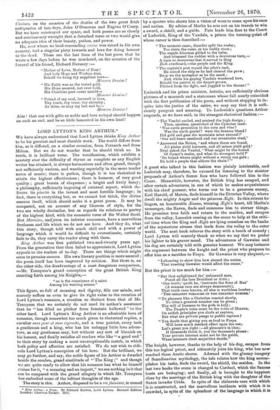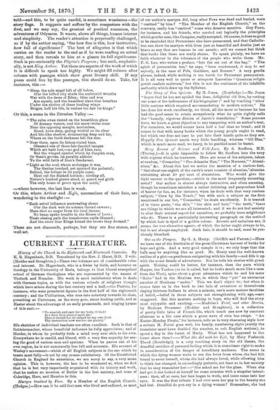LORD LYTTON'S KING ARTHUR.*
WE have always understood that Lord Lytton thinks King Arthur to be his greatest and most durable work. The world differs from him, as it differed, on a similar occasion, from Petrarch and from Milton. But we do not wonder that he should think so. In truth, it is brilliant verse. The versification, which exhibits a mastery over the difficulty of rhyme as complete as any English writer has attained, is always harmonious and often grand, though not sufficiently various, and wanting especially in the more tender notes of music; there is pathos, though it is too rhetorical to attain the highest effectiveness ; there is humour, of very good quality ; great bursts of eloquence ; a bright and lively fancy; a philosophy, sufficiently imposing of external aspect, which de- livers its placita in the tersest and most forcible language ; in fact, there is everything but, as we cannot but think, the divine essence itself, which should make it a great poem. It may be compared, not on account of any likeness of style, for the two are wholly dissimilar, but as regards its relations to poetry of the highest kind, with the romantic verse of Sir Walter Scott. But Herndon, and:even its inferior successors, have a marvellous freshness and life which we do not see here. And they do, what this story, though told with much skill and with a power of language which it would be difficult to overestimate, certainly fails to do, they carry the reader along with them.
King Arthur was first published two-and-twenty years ago. From the generation that then failed to appreciate it, Lord Lytton appeals to the readers of to-day. There are things which might seem to promise success. His own literary position is more assured ; the poem itself has been improved by revision. But there is, on the other side, the disadvantage of a most dangerous comparison, —Mr. Tennyson's grand conception of the great British King standing forth among his Knights,— " as is the conscience of a saint Among his warring senses."
This figure, so full of meaning and dignity, fills our minds, and scarcely suffers us even to give its right value to the creation of Lord Lytton's romance, a creation so distinct from that of Mr. Tennyson that we certainly do not need its author's assurance that he "has filled no pitcher from fountain hallowed" to the other bard. Lord Lytton's King Arthur is an admirable hero of romance, though somewhat too much given to rhetorical replies, a cavalier sans peur et sans reproche, and a true patriot, every inch a gentleman and a king, who has his unhappy little love adven- ture, as any gentleman may, but without any sort of blemish on his honour, and finally satisfies all readers who like "a good end" to their story by making a most unexceptionable match, in which both policy and affection are satisfied. We do not wish to ridi- cule Lord Lytton's conception of his hero. But the brilliant, we may go further, and say, the noble figure of his Arthur is dwarfed beside the sombre, grand similitude of "The King ;" and though we are quite ready to allow that his romance has what he himself claims for it, "a meaning and an import," we see nothing in it that can be compared with the grand allegory in which Mr. Tennyson has embodied some of the loftiest thoughts of the age.
The story is this. Arthur, disposed to be a roi faineant, is rouged • King Arthur: a Poem.. By Edvrard Bulwer, Lord Lytton. Revised Edition. London: Chariton Tucker. 11370.
by a spectre who shows him a vision of woes to come upon his race and nation. By advice of Merlin he sets out on his travels to win a sword, a shield, and a guide. Fate leads him first to the Court of Ludovick, King of the Vandals, a prince the turning-point of whose career is thus described:—
" The moment came, disorder split the realm ;
Too stern the ruler, or too feebly stern ; The supple kinsman glided to the helm, And trimmed the rudder with a dexterous turn,— A turn so dexterous that it served to fling
Both overboard,—the people and the Sing.
"The captain's post repaid the pilot's task, He seized the ship as he had cleared the prow; Drop we the metaphor as he the mask : And, while his gaping Vandals wondered how, Behold the patriot to the despot grown, Filched from the fight, and juggled to the throne!"
Ludovick and his prime minister, Astutio, are sufficiently obvious pictures of a monarch and a statesman whose fall nearly coincided with the first publication of the poem, and without stopping to in- quire into the justice of the satire, we may say that it is suffi- ciently pungent and amusing. To Ludovick's questions Arthur. responds, as we have said, in the strangest rhetorical fashion :—
" The Vandal smiled, and praised the high design ; Then, careless, questioned of the Cyrarian land: Was earth protection to the corn and vine ? Was the earth genial? were the breezes bland? Did gold and gem the mountain mine conceal?' 'Oar soil bears manhood and our mountains steel,'
"Answered the Briton, 'and where these are found, All plains yield harvests, and all mines yield gold.' Next asked the Vandal, What might be the bound Of Cymri'a realm, and what its strongest hold?' Its bound where might without a wrong can gain ; Its hold a people that abhors the chain !' "
A guest who talked in this fashion was plainly intolerable, an Ludovick may, therefore, be excused for listening to the sinister- proposals of Arthur's Saxon foes who have followed him to the- Court. Meanwhile, however, the British king has escaped, and after certain adventures, in one of which he makes acquaintance- with his chief pursuer, who turns out to be a generous enemy, Earl Harold, of Mercia, finds himself in the Etrurian Valley, where- dwell the mighty Augur and the princess 2Egle. In this retreat he- lingers, an honourable .7Eneas, winning 2Egle's heart, till Merlin's- messenger, the Raven, finds and summons him to sterner things. He promises true faith and return to the maiden, and escapes from the valley, Lancelot coming on the scene to help at the criti- cal time when the King and 2Egie are lying senseless on the banks of the mysterious stream that leads from the valley to the outer world. The next book relieves the story with a touch of comedy ; Lord Lytton will scarcely thank us when we say that we prefer- his lighter to his graver mood. The adventures of Gawaine and his dog are certainly told with genuine humour. We may instance- the argument between the knight and the priest who proposes to. offer him as a sacrifice to Freya. Sir Gawaine is very eloquent,— " Labouring to show him how absurd the notion That roasting Gawaine would affect the ocean."
But the priest is too much for him :-
"But that enlightened tho' unlearnfid man,
Posed all the lore Druidical or Attic ; One truth,' quoth he, 'instructs the Sons of Ran' (A seaman race are always democratic), That truth once known, all else is worthless lumber TILE GREATEST PLEASURE OF THE GREATEST NUMBER.'
"No pleasure like a Christian roasted slowly, To Odin's greatest number can be given ; The will of freemen to the gods is holy ; The People's voice must be the voice of Heaven.
On selfish principles you chafe at capture, But what are private pangs to public rapture ?
"You doubt that giving you as food to Freya Will have much marked effect upon the sea; Let's grant you right :—all pleasure's in idea; If thousands think it, you the thousands please : Your private interest must not be the guide, When interests clash majorities decide."
The knight, however, thanks to the help of his dog, escapes from this too logical priest, and ultimately joins his king, who has now reached these Arctic shores. Adorned with the gloomy imagery- of Scandinavian mythology, the tale relates how the king accom- plishes his tasks, finds the sword, the shield, the maiden. In the last two books the scene is changed to Carduel, which the Saxon* hosts are besieging ; and finally, all is brought to the happiest close by the marriage of the British king with the daughter of the Saxon invader Crida. In spite of the elaborate care with which it is constructed, and the marvellous incidents with which it is crowded, in spite of the splendour of the language in which it is • told—and this, to be quite candid, is sometimes wearisome—the etory flags. It suggests and suffers'by the comparison with the -first, and we may say, the greatest of poetical romances, the adventures of Odysseus. It wants, above all things, human interest and simplicity. The reader's attention is perpetually challenged, as if by the author saying, 'See how fine is this, how instructive, &ow full of significance !' The best of allegories is that which carries on the reader to the end as if he were reading an actual story, and then reveals to him at a glance its full significance. Such is pre-eminently the Pilgrim's Progress ; but such, emphatic- ally, is not King Arthur. Yet there are aspects of the work of which it is difficult to speak too highly. We might fill column after .column with passages which show great literary skill. If any poem could live by fine passages, this should do so. Take, for instance, this :— "Sleep, the sole angel left of all below,
O'er the lulled city sheds the ambrosial wreaths Wet with the dews of Eden; bliss and woe Are equals, and the humblest slave that breathes Under the shelter of these healing wings Reigns, half his life, in realms too fair for kings."
Or this, a scene in the Etrurian Valley :— " The calm swan rested on the breathless glass
Of dreamy waters, aud the snow-white steer Near the opposing margin, motionless, Stood, knee-deep, gazing wistful on its clear And life-like shadow, shimmering deep and far, Where on the lurid darkness fell the star.
4' Near them, upon its lichen-tinted base, Gleamed one of those fair-fancied images
Which art loath lost,—no god of Idan race, But the winged symbol which by Caspian seas, Or Susa's groves, its parable addrest To the wild faith of Iran's Zendavest.
aLight as the soul, whose archetype it was, The Genius touched, yet spurned the pedestal; Behind, the foliage in its purple mass, Shut out the flushed horizon; circling all, Nature's hushed giants stood, to guard and girth The only home of peace upon the earth,"
—where however, the last line is weak.
Or this, where Arthur and /Egle, unconscious of their fate, are wandering in the starlight :—
"Each astral influence unrevealing shone O'er the dark web its solemn thread enwove ; Mars shot no anger from his fatal throne, No beam spake trouble in the House of Love ; Their closing path the treacherous smile illumed ; And the stern Star Kings kissed the brows they doomed."
'These are not diamonds, perhaps, but they are fine stones, and well set.



































 Previous page
Previous page